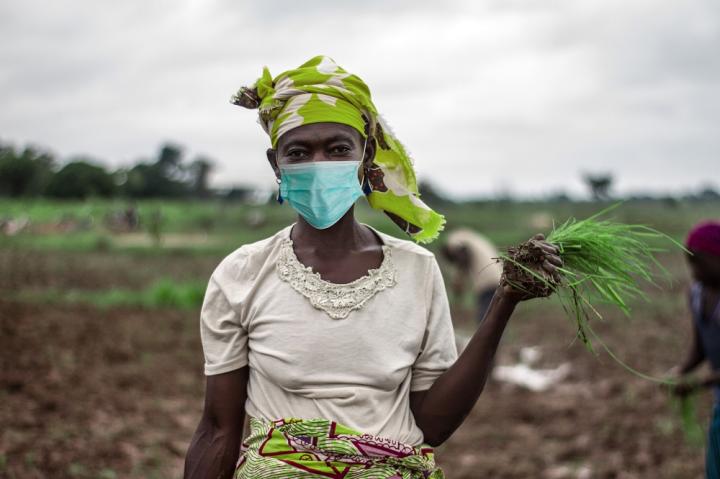CABI scientists have conducted new research highlighting the impact of COVID-19 pandemic on food security in Kenya and Uganda with more than two-thirds of those surveyed having experienced economic hardship due to the pandemic.

Credit: CABI
CABI scientists have conducted new research highlighting the impact of COVID-19 pandemic on food security in Kenya and Uganda with more than two-thirds of those surveyed having experienced economic hardship due to the pandemic.
Dr Monica Kansiime led a team of researchers who discovered, from a random sample of 442 respondents, that the proportion of food insecure people increased by 38% and 44% in Kenya and Uganda respectively.
The scientists, who conducted online questionnaires using WhatsApp, Facebook, Telegram, Twitter and email, also found that, in both countries, the regular consumption of fruits decreased by around 30% during the COVID-19 pandemic compared to before the crisis struck.
Besides income effects, the respondents mentioned other COVID-19-induced social challenges such as restricted movements, interrupted work schedules, mental health issues, and isolation.
Dr Kansiime said, “Taken together, the results suggest that although the COVID-19 pandemic is causing detrimental effects on all economic sectors, farmers are more likely than salary and wage earners to report suffering income shocks.
“Potential explanations include difficulties for farmers to go to farms, access inputs or transport their produce to markets due to COVID-19 induced lockdown. Compared to salary and wage-earning workers, the farmers in this sample earned relatively low incomes. Consequently, even a small shock to their income-earning activity could cause devastating effects.”
The study, published in the journal World Development, suggests that households indicated a change in their dietary patterns in response to the COVID-19 outbreak by consuming less diverse diets, skipping meals, and reducing portions of food consumed. This points to the negative impacts of the pandemic on household food and nutrition security, the scientists say.
Dr Justice Tambo, co-author, added, “During the COVID-19 period in Kenya, more than half of the respondents were worried about insufficient food, unable to eat healthy and nutritious food, ate reduced portions of food, and consumed limited food varieties. However, before the COVID-19 outbreak, only 30% of the respondents in Kenya experienced these food insecurity situations.
“Similarly, the number of respondents in Uganda who reduced the amount of food eaten, were unable to eat healthy and nutritious food, consumed less diverse diets, or were worried about not having enough food to eat increased significantly by about 30, 35, 45, and 50 percentage points, respectively, during the COVID-19 period relative to a normal period.”
Except for vegetables in Kenya, the number of respondents who regularly consumed each of the five food groups – fruits, vegetables, fish and seafood, meat and poultry – reduced by about 50 percentage points during the pandemic.
This is a cause for concern, the researchers argue, given that some of these food groups are important sources of micronutrients needed for good health. Estimates suggesting that over two billion people worldwide already suffer from micronutrient deficiency.
To buttress the effects of the pandemic on income-generating activities, a self-employed respondent in Kenya remarked: “Since the last 45 days of the outbreak of this deadly disease, so many people have travelled back to rural areas to hide. This has made my business weak because most of my customers went away, and the current situation now is nothing but survival. There is no movement after 7pm, and this is reducing the business activity hence lowering income. Life is hard, generally.”
As a result of the hardships faced by residents in Kenya and Uganda the respective governments have put in place range of financial and economic policy changes to try and mitigate the impacts.
These include, in Kenya, proposals for a post-COVID-19 economic stimulus package of 53.7 billion shillings ($503 million) to support businesses that have been hit by the pandemic.
Meanwhile in Uganda, the government introduced repayment holidays, debt relief of up 12 months, and a reduction of the central bank lending rate from 9% to 8%. Food relief to vulnerable workers has also been considered particularly those whose daily activities would be affected by the lockdown, in a way of extending social protection to vulnerable sections of the population.
However, it is feared that social assistance programmes like direct cash and in-kind transfers to households and waiver of utility fees could have yielded more favourable outcomes to such households, in particular, the wage earners whose earning has been affected by restrictions.
“The relief measures came into effect when people had already lost their sources of income, and social protection measures were hardly implemented due to logistical challenges, hence amounting to minimal relief,” Dr Kansiime said.
The scientists believe the results of the survey suggest that that ongoing and future government responses should focus on structural changes in social security by developing responsive packages to cushion members pushed into poverty by such pandemics.
Such measures, they say, should also build strong financial institutions to support the recovery of businesses in the medium term, and ensuring the resilience of food supply chains particularly those making available nutrient-dense foods.
###
Additional information
Full paper reference
Monica K. Kansiime, Justice A Tambo; Idah Mugambi; Mary Bundi; Augustine Kara; Charles Owuor, ‘COVID-19 implications on household income and food security in Kenya and Uganda: Findings from a rapid assessment,’ 18 September 2020, World Development, DOI: 10.1016/j.worlddev.2020.105199
The paper can be read open access here: https:/
Media Contact
Wayne Coles
[email protected]
Original Source
https:/
Related Journal Article
http://dx.




